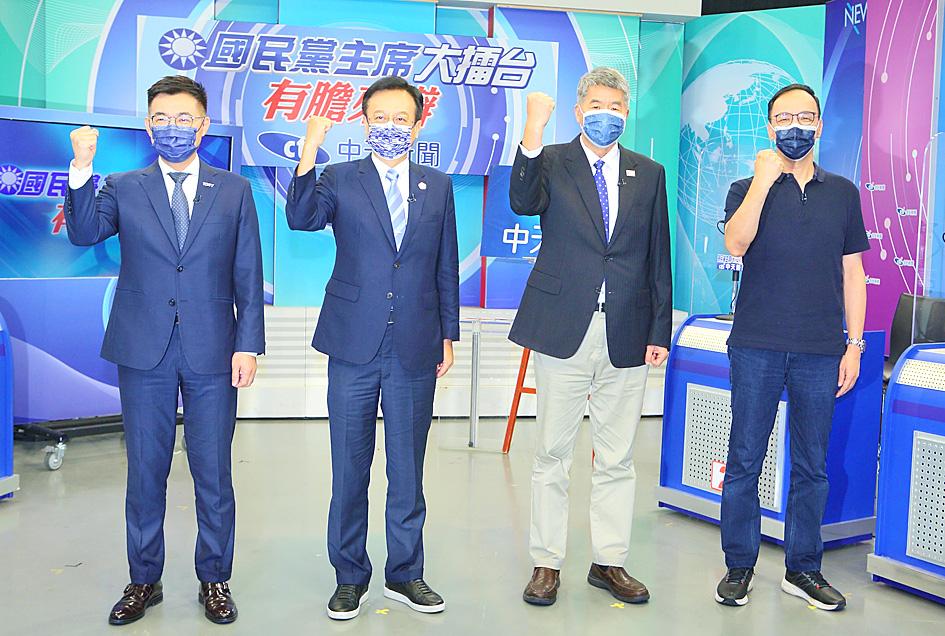Chinese Nationalist Party (KMT) chairperson candidates yesterday focused on the so-called “1992 consensus” during a televised policy debate ahead of next week’s election.
KMT Chairman Johnny Chiang (江啟臣) said the party should return to the “original definition of the consensus,” adding that the concept was no longer a poison pill for voters, as the Democratic Progressive Party (DPP) had demonstrated its inability to handle cross-strait relations.
The “1992 consensus” — a term that former Mainland Affairs Council chairman Su Chi (蘇起) in 2006 admitted making up in 2000 — refers to a tacit understanding between the KMT and the Chinese Communist Party (CCP) that both sides of the Taiwan Strait acknowledge that there is “one China,” with each side having its own interpretation of what “China” means.

Photo courtesy of CTV
Former KMT chairman Eric Chu (朱立倫) said that he has also emphasized that each side has its own interpretation of the “1992 consensus” and had reiterated this to Chinese President Xi Jinping (習近平) when they met in 2015.
“In essence, there must be a creative ambiguity, instead of clear-cut clarity,” Chu said.
Sun Yat-sen School president Chang Ya-chung (張亞中) said that while the “1992 consensus” should remain the party’s guiding principle, it is outmoded and can no longer address the political situation of cross-strait relations.
If elected, he said he would visit Beijing to find common ground that both sides can accept and to sign a memorandum of understanding for peace, adding that this would require that both sides take a step back.
Former Changhua County commissioner Cho Po-yuan (卓伯源) said that the DPP’s abandonment of the “1992 consensus” has led to heightened tensions across the strait, adding that he believed attempts to deepen the “consensus” would be the way toward peace.
On whether the party should change its name, Chu said he was “absolutely against” changing it to “Taiwan Kuomintang.”
Such an act would sever the party from its past, he said, adding that the KMT should push against efforts to create pro-Taiwan independence high-school curricula, which would mislead young people about the nation’s roots.
Chang said the KMT was founded by Sun Yat-sen (孫逸仙) and had a century’s history and glory to its name, adding that the word Chinese (中國) in the party’s official name also held meaning.
“It is a place that our revolutionary forefathers spilled blood for,” Chang said, adding that the word does not simply mean the People’s Republic of China, as “it also means us. We are Chinese. Taiwanese are Chinese, as they are also Taiwanese.”
During the debate, Chu said that if Chang were elected, he would steer the KMT toward rapid unification, while Chang said that he was “extremely unhappy” that Chu was attempting to divide the party.
Instead of lobbing accusations that the KMT is leaning toward China and selling out the country or that the DPP is simply a stooge for the US, Chiang said that the country needs to sit down with the CCP to discuss matters, adding that he is willing to visit China should he be re-elected.
He said that the KMT must bring the fight to the DPP, as Taiwanese have for a long time been subject to a single source of information.
The KMT chairperson election is set for Saturday next week.

Taiwan has received more than US$70 million in royalties as of the end of last year from developing the F-16V jet as countries worldwide purchase or upgrade to this popular model, government and military officials said on Saturday. Taiwan funded the development of the F-16V jet and ended up the sole investor as other countries withdrew from the program. Now the F-16V is increasingly popular and countries must pay Taiwan a percentage in royalties when they purchase new F-16V aircraft or upgrade older F-16 models. The next five years are expected to be the peak for these royalties, with Taiwan potentially earning

STAY IN YOUR LANE: As the US and Israel attack Iran, the ministry has warned China not to overstep by including Taiwanese citizens in its evacuation orders The Ministry of Foreign Affairs (MOFA) yesterday rebuked a statement by China’s embassy in Israel that it would evacuate Taiwanese holders of Chinese travel documents from Israel amid the latter’s escalating conflict with Iran. Tensions have risen across the Middle East in the wake of US and Israeli airstrikes on Iran beginning Saturday. China subsequently issued an evacuation notice for its citizens. In a news release, the Chinese embassy in Israel said holders of “Taiwan compatriot permits (台胞證)” issued to Taiwanese nationals by Chinese authorities for travel to China — could register for evacuation to Egypt. In Taipei, the ministry yesterday said Taiwan

Taiwan is awaiting official notification from the US regarding the status of the Agreement on Reciprocal Trade (ART) after the US Supreme Court ruled US President Donald Trump's global tariffs unconstitutional. Speaking to reporters before a legislative hearing today, Premier Cho Jung-tai (卓榮泰) said that Taiwan's negotiation team remains focused on ensuring that the bilateral trade deal remains intact despite the legal challenge to Trump's tariff policy. "The US has pledged to notify its trade partners once the subsequent administrative and legal processes are finalized, and that certainly includes Taiwan," Cho said when asked about opposition parties’ doubts that the ART was

If China chose to invade Taiwan tomorrow, it would only have to sever three undersea fiber-optic cable clusters to cause a data blackout, Jason Hsu (許毓仁), a senior fellow at the Hudson Institute and former Chinese Nationalist Party (KMT) legislator, told a US security panel yesterday. In a Taiwan contingency, cable disruption would be one of the earliest preinvasion actions and the signal that escalation had begun, he said, adding that Taiwan’s current cable repair capabilities are insufficient. The US-China Economic and Security Review Commission (USCC) yesterday held a hearing on US-China Competition Under the Sea, with Hsu speaking on